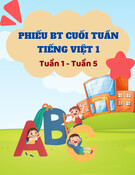
Đ C NG ÔN T P KI M TRA H C K I - L P 10 C B N – NĂM H C 2019-2020Ề ƯƠ Ậ Ể Ọ Ỳ Ớ Ơ Ả Ọ
I. Pronunciation
Choose the word that has the underlined (letters) pronounced differently from the others:
1. A. today B. work C. progressive D. together
2. A. ready B. meat C. defeat D. beat
3. A. kitchen B. history C. time D. finish
4. A. like B. little C. interest D. hit
5. A. repeat B. heart C. eat D. read
6. A. study B. student C. studio D. stupid
7. A. holiday B. boss C. hobby D. more
8. A. hard B. start C. party D. talk
9. A. son B. sunshine C. above D. woman
10. A. elephant B. enable C. better D. pen
11. A. women B. men C. weekend D. recommend
12. A. miss B. little C. child D. listen
13. A. chemistry B. prepare C. receive D. degree
14. A. tragic B. mature C. husband D. another
15. A. computer B. turn C. miraculous D. accuracy
16. A. feather B. head C. healthy D. meat
17. A. technology B. different C. mental D. dentist
18. A. various B. bad C. hang D. jam
19. A. football B. pool C. tool D. moon
20. A. good B. cook C. wool D. tooth
II. Find mistake
Choose the underlined part that is incorrect:
21. A fax machine used to send and receive letters quickly.
A B C D
22. The young has future in their hands. Do you think so?
A B C D
23. Has a new hospital for children built in your city?
A B C D
24. The film is about a boy which lost all money in the fire.
A B C D
25. There used to being a pagoda in front of my school.
A B C D
26. Two new houses have just been build here.
A B C D
27. It is time the government helped the unemploy to find some jobs.
A B C D
28. I have met my wife ten years ago.
A B C D
29. A dumb is a person whom cannot speak.
A B C D
30. They intend to make a two – weeks excursion next month.
A B C D
31. The girl whom you met last night used to being a singer.
A B C D
32. His family is used to spend most of the time in the open air.
A B C D
33. How much students are there in your class?
A B C D

34. Ha Noi , that is the capital of our country, is a city of peace
A B C D
35. If it rains, we had to cancel the meeting scheduled for today
A B C D
36. Nam isn't used to drive on the left.
A B C D
37. I haven't met him since a long time.
A B C D
38. The person which can not see anything is called a blind person.
A B C D
39. Dennis used to smoking a lot a year ago.
A B C D
40. It took him a long time to get used to drive on the left.
A B C D
41. There used to being a market near my house.
A B C D
42. I'll fly to Mars next week. I've already gotten a ticket.
A B C D
43. He has bought some bricks and he will build a garage.
A B C D
44. Her well-known film, that won several awards, was about the life of Lenin.
A B C D
45. Her old grandmother is not enough strong to go walking up hills.
A B C D
46. Every day, Lan has breakfast then she go to school.
A B C D
47. Look. There are a lot of black clouds in the sky.It will rain.
A B C D
48. He suggested to go to the cinema with him.
A B C D
49. We only get home from Australia yesterday.
A B C D
50. I want to travel because I enjoy to meet people and seeing new places.
A B C D
III. Choose the best answer to complete the following sentences
51. A: We have run out of milk.
B: Oh, have we ? I _________ and get some.
A. would go B. will go C. will be going D. was going
52. Tony: _____________________. Ann: In a house near Brighton.
A. What’s your address? B. Where are you? C. Where you live? D. Where do you live?
53. “_________ do you go to work?” – “ By bus”
A. Who B. Why C. How D. What
54. “ _________ yesterday?” – “I went to the post office.”
A. Where did you go B. What did you do
C. How did you go D. Why did you do
55. David: “ Happy Christmas!” Jason: “ ………… . . ”
A. You are the same! B. Same for you! C. The same to you D. Happy Christmas
56. - “Bye!” – “_____________.”
A. See you lately B. Thank you C. Meet you again. D. See you later
57– “______________?” – “He's tall and thin with blue eyes.”
A. What does John look like B. Who does John look like
C. How is John doing D. What does John like
58. – “_______________?” – “I have got a terrible headache.”
A. What’s the matter with you B. What’s the wrong with you

C. What’s happened with you D. What’s problem with you
59. – “Thank you for a lovely evening”. – “…………”
A. Have a good day B. You are welcome C. Thanks D. Cheer
60. Ann: “______ where the nearest post office is?”
Linda: “Turn left and then turn right.”
A. Could you tell me B. Should you show me C. Do you tell me D. Will you say me
IV. Choose the best answer to complete the following sentences
61. Would you mind _______________ that again?
A. explain B. explained C. explaining D. to explain
62. Jack_____ for London a few days ago.
A. leaves B. left C. had left D. has left
63. He had finished his homework before he______ out with his friends.
A. goes B. went C. has gone D. had gone
64. They ______ living on farms and working on fields
A. are used to B. are used for C. used to D. did not use to
65. I _________ with my family, but now I live alone.
A. used to live B. am used to living C. am used to live D. is used for living
66. A _____ is a film or a radio or television program giving facts about something.
A. documentary B. comedy C. cartoon D. news
67. People who are deaf, dumb, blind or mentally retarded are called _______
A. disabling B. disable C. the able D. the disabled
68. When I lived in the countryside, I __________ go fishing with my father.
A. use to B. used to C. using to D. useful
69. A dumb person is the one ______________ is not able to speak.
A. which B. whose C. whom D. who
70. A lot of trees _________ for firewood by the farmer.
A. was cut B. had been cut C. is cut D. have been cut
71. Jane works for a company _________ makes shoes.
A. who B. which C. whom D. whose
72. Life is all right if you have a job, but things are not so easy for………………
A. the unemployed B. the poor C. the famous D. the young
73. Marie Curie was a ................student. She had a fully developed mind.
A. old B. strong C. mature D. young
74. May I suggest you let_______
a. Mary doing so b. Mary do so c. Mary does to d. Mary to do so
75. John is too short_______ reach the top of the bookshelf.
a. to b. not to c. to not d. for
76. We _____ in a new house at the moment.
A. are living B. were living C. had lived D. have lived
77. People ____ English and French in Canada.
A. speak B. have spoken C. had spoken D. are speaking
78. The earth ______________ the sun once every 365 days.
A. circles B. Circle C. has circled D. circled
79. Look at those cars! They_______
a. will crash b. are crashing c. will be crashed d. are going to crash
80. The street is very noisy, _______ makes sleeping difficult.
A. that B. what C. which D. it
81. You can change the TV channels with this ________ control.
A. far B. remote C. standby D. special
82. We are going on a ________ to Nha Trang at weekend.
A. two day trip B. two-days trip C. two-day trip D. twoday trip
83. He is tired. He stops _______ a cup of tea.
A. having B. to have C. have D. has
84. I haven’t met him since he __________ school
A. was leaving B. left C. had left D. was left

85. The ______ are those who do not have a job.
A. injured B. sick C. unemployed D. rich
86. A new school ____ in our town recently.
A. has been built B. was built C. were built D. is built
87. He got wet_______ he forgot his umbrella.
A. because of B. because C. but D. and
88. He stops working _______ heavy raining.
A. in spite of B. although C. despite D. because of
89. Many people believe him__________ he often tells a lie.
A. because B. in spite of C. although D. because of
90. Tom wakes his parents up_______ playing the guitar very softly.
A. because B. in spite of C. because of D. although
Choose the best answer
91. Water and oil……..
a. do not mix does not mix has not mixed is not mix
92…….. on Sundays
a. Always he gets up late b. He always gets up
c. Does he get up always late d. He gets always up
93.Did you say that you …….here only three days ago
a. came b. had come c. have come d. come
94.I haven’t met him since he……..school
a. left b. was leaving c. had left d. was left
95.Peter does not feel satisfied with his new job. ……… about it
a. He has always complained b. He always has complained
c. Always he has complained d. He has complained always
96.It ……. me fifteen minutes to get to school every morning
a. takes b. took c. has taken had taken
97.He ……. twenty calves last week, now he them up to sell
a. had bought/fed b. buys/feeds
c. bought/is feeding d. was buying/fed
98.Kerry……. hard on the violine lastweek
a. practices b. practiced c. has practiced d.is practicing
99.The boys……. football in the field every evening but yesterday they…….. basketball instead
a. played/played b. played/play
c. play/play d. play/played
0.My alarm clock …….at six o’clock every morning and I jump out of bed to get ready for school
a. rings b.is ringing c.rang d. rung
101.Ms Lan enjoys ……. because she loves working with children
a.to teach b.to be taught c. teaching d. teach
0.He insisted in ……. the job himself
a.to do b.do c. doing d. having done
103. ……. do you take a holiday?
a. when b. how long c. what time d. how often
104.Could you please stop ……. so much noise?
a. making b. doing c. taking d. spending
105. …… did the Second World War end?- In 1945
a. where b. when c. what time d. how long
106.It was a nice day, so we decided ……. for a walk
a.to have b.to go c.to take d.to make
107.I don’t mind ……. you to do the washing-up
a. help b. helping c. helped d.to help
108.Dad allowed Done ……. to the party
a. going b.to go c. go d. gone
109.You should try ……. English; You will find it very exciting

a.to learn b. learnt c. learning d. learn
110.My glasses are in my book, but I don’t remember …….. them there
a. putting b.to put c. put d. I put
111. After it ……. dry for two months, it rained heavily last night.
a. had been b. was c. has been d. would be
112. When I ……. to visit him, he…….. to work
a. came/ gone b. came/had gone
c. had come/ went d. had come/ had gone
113. Kenny…….. his driving test before he bought a car
a. had taken b. has taken c. was taken d. were taken
114.When you phoned me, it ……. my lunch time
a. was b.is c. being d. were
115.Miss Kim …….. all our books by the time we arrived
a. had marked b. have marked c. had marke d. will have marked.
116. She reassured me that she............the card.
a. had posted b. has posted c. were posting d. posts
117. When I was little, my father gave me some advice. He said ............to the strangers.
a. I shouldn't talk b. that shouldn't talk
c. don't talk d. that I don't talk
118. 'Should we turn left or go straight? "Hmm. I'm not sure which way ............
a. do we turn b. to turn c. should we turn d. it turned
119. She ............her holiday in Finland.
a. said me about b. tolding about c. said about d. told me about
120. I don't know why Susan didn't go to the meeting. She said ............
a. she will definitely go. b. she was definitely going.
c. she has definitely gone. d. she is definitely going.
121. The librarian asked us............ so much noise.
a. don't make b. not make c. not making d. not to make
122. Somebody forgot this hat. I wonder
a. whose is this hat. b. whose hatis this.
c. whose hat it is d. is This whose hat.
123. 'I'm taking my driving test tomorrow.'
When I saw Rachel, she said................................
a. she was taking her driving test the next day.
b. she is taking her driving test the following day.
c. I was taking my driving test tomorrow.
d. she was taking the driving test tomorrow.
124. 'Whose composition haven't we heard yet?'
The teacher asked us to tell her......................
a. whose composition we haven't heard yet.
b. whose composition we hadn't heard vet.
c. whose composition hadn't we heard yet.
c. whose composition we hadn't heard yet?
125.'Why don't you join us for coffee, Don?'
After the movie, we asked Don .............................
a. would he join us for coffee. b. why he didn't join us for coffee.
c. to join us for coffee. d. join us for coffee.
126. 'You look beautiful in that dress.
' Last night she told me …………….
a. you look beautiful in that dress. c. I'll look beautiful in this dress
b. you looked beautiful in that dress. d. I looked beautiful in that dress.
127. 'What did your grammar teacher want to talk to you about?'
'I did badly on the last test. She ................ studied for it.'
a. said why hadn't I b. said why I hadn't




![Bài tập so sánh hơn và so sánh nhất của tính từ [kèm đáp án/mới nhất]](https://cdn.tailieu.vn/images/document/thumbnail/2025/20250808/nhatlinhluong27@gmail.com/135x160/77671754900604.jpg)
![Tài liệu tham khảo Tiếng Anh lớp 8 [mới nhất/hay nhất/chuẩn nhất]](https://cdn.tailieu.vn/images/document/thumbnail/2025/20250806/anhvan.knndl.htc@gmail.com/135x160/54311754535084.jpg)




![Tài liệu Lý thuyết và Bài tập Tiếng Anh lớp 6 [Mới nhất]](https://cdn.tailieu.vn/images/document/thumbnail/2025/20250802/hoihoangdang@gmail.com/135x160/18041754292798.jpg)





